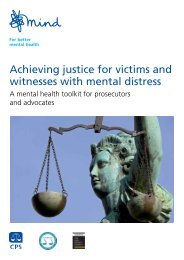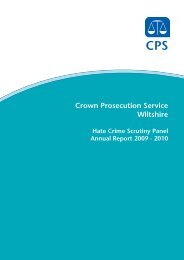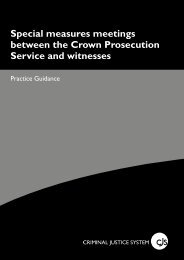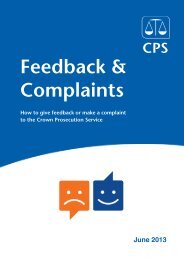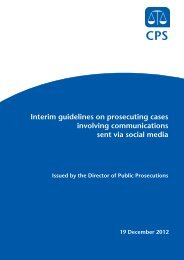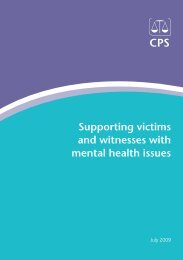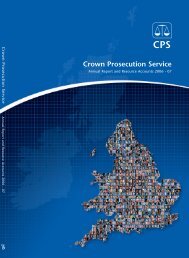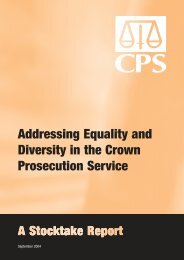CPS Policy on Prosecuting Criminal Cases Involving Children and ...
CPS Policy on Prosecuting Criminal Cases Involving Children and ...
CPS Policy on Prosecuting Criminal Cases Involving Children and ...
Create successful ePaper yourself
Turn your PDF publications into a flip-book with our unique Google optimized e-Paper software.
Giving evidence in the courtroomIn some of the less serious cases a child may have to give evidence in the courtroombecause the magistrates or judge may not agree to a child using the live link.Similarly, if there is a good reas<strong>on</strong> why child witnesses do not want to use the live link, wecan ask the magistrates or judge to allow them to give their evidence in the courtroom.We think it is best, however, for children to use the live link so they do not have to be inthe courtroom at all. If they do give evidence in the courtroom we can ask for a screenaround the child so they will not have to see the defendant.Cross-examinati<strong>on</strong>The child will usually be in the live link room, unless the court has decided they should giveevidence from the courtroom.How questi<strong>on</strong>s should be askedAdvocates should:use words that match the age <strong>and</strong> the abilities of child witnessesallow children time to answer questi<strong>on</strong>s.Advocates have to challenge the evidence given by witnesses but they should not use:over-harsh cross-examinati<strong>on</strong> with any child witnesswords <strong>and</strong> phrases that children cannot easily underst<strong>and</strong>.If a prosecuti<strong>on</strong> advocate thinks a defence advocate is being too aggressive, or not giving achild time to answer, they will ask the magistrates or judge to intervene; Prosecutors'Pledge: Protect victims from unwarranted or irrelevant attacks <strong>on</strong> their character <strong>and</strong> mayseek the court's interventi<strong>on</strong> where cross-examinati<strong>on</strong> is c<strong>on</strong>sidered to be inappropriate oroppressive.Prosecuti<strong>on</strong> advocates will ask magistrates <strong>and</strong> judges to make sure that children caneasily underst<strong>and</strong> the questi<strong>on</strong>s they are asked.Further informati<strong>on</strong>There are details under the list of publicati<strong>on</strong>s <strong>and</strong> materials of informati<strong>on</strong> produced forchildren to explain what happens at court.After the trialSometimes it can take several days to make decisi<strong>on</strong>s in complex cases. The witness careofficer will tell victims <strong>and</strong> witnesses what the result was if they were not at court to hear itthemselves.If the defendant is not guiltyMagistrates or juries must be sure of the defendant's guilt if they are to c<strong>on</strong>vict. If they arenot sure then they must find the defendant not guilty (this is sometimes described as 'areas<strong>on</strong>able doubt'). If the magistrates or jury decide the defendant is not guilty, this doesnot always mean they did not believe the witnesses. Juries do not have to give reas<strong>on</strong>s fortheir decisi<strong>on</strong>s, so it is not possible to know how they reached their decisi<strong>on</strong>.



